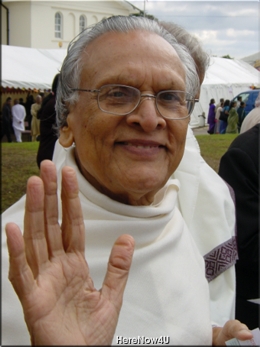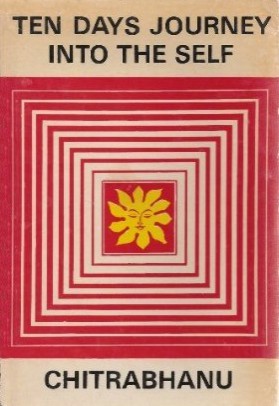My heart is vibrating with reverence for life....
Friends. Let us concentrate on the third virtue which the spiritual aspirant requires, which is compassion Here the Immortal Song says, “May my heart bleed at the sight of the wretched, the cruel, and the poor. And may tears of compassion flow from my eyes."
Often we are so involved in ourselves and in our own affairs, that we do not think of the suffering of other people, or of plants and animals. Yet not only a few saints and enlightened persons, but all of us must feel the pain of other living beings and try to help them. Tears are only the starting point of compassion! I say we must first care, and then care for and then try to change the customs and conditions that give rise to such widespread suffering!
Not only for those who are hurt, but also for the cruel who are causing the pain must we have compassion! The word sin means “missing the mark.'' Nothing so misses the mark as violence, which is as true for the violent word as for the violent deed. We must care for those whose “missing the mark" is obvious to us and befriend them rather than putting them down. Otherwise we shall be missing the mark ourselves.
Once President Lincoln was returning to the White House, riding in his carriage and dressed in his best, when he noticed a small pig by the side of the road, mired in mud. It was squealing and squirming wildly, but all its efforts merely drove it deeper into the mud. Lincoln ordered the coach to stop, got out, and waded into the mire. He tugged and pulled until he managed to free the pig. Upon his arrival home, his family and friends noticed the mud all over his clothes, and while he went to change them, the coachman explained what had happened. When the President reappeared, everyone flocked around him, praising him for his kindness. He told them, “Please save your praises. When I saw this little creature in such distress, it was as if there were a thorn driven into my own heart. And so I plucked it out. Therefore it was really my own pain that I eased more than that of the pig." This is compassion!
If we have compassion, in today's world it will lead us to choose a simple life style. We must think constantly of those who not only enjoy none of the fruits of technology, but lack even food for them-selves and their children. Our lack of concern contributes to their material deprivation.
Here in this city a friend of mine saw a very old man begging. My friend had the impulse to give the old man something, but found that he had left his money at home. He went up to him and told him, “I am really sorry I cannot give you any money, because I find I have left my wallet at home. But I wish to offer you my hand and tell you how much it pains me to see you going hungry here on the street." The old man smiled at him and replied, “Friend, now I do not need food, for I have been fed by your love. You are the first person who has ever spoken to me this way." My friend was glad he had made his small gesture of concern. This illustrates how compassion benefits both giver and receiver.
Also, compassion must of course eventually lead us to look for the roots of poverty and racism and violence in power and greed and fear. Why in today's world are two-thirds of the population still starving? Why does such a huge percentage of our time, money, and resources have to go for destruction. Compassion cannot stop with the symptoms, but must seek for the disease and its cure. Each of us must ask himself, “Am I looking for the roots of poverty and violence in myself and in the world? Am I dedicating myself to the changes in myself and in the world that will bring about the maximum well-being of all?"
Often, out of compassion, a time-honored custom has to be violated. In India, monks are not supposed to touch women. Once when I was a young monk, I lifted two women out of a window to rescue them from a burning house in which they could have been burned to death. Many people criticized the breaking of tradition; but in their criticism they failed to see the meaning of compassion. In the nuclear age, custom must give way to compassion for self as well as others for man to survive on this planet.
Our compassion must extend also to the aged. You know in India we consider it a privilege to take care of our old people. And they require as much love and concern as do the children. You are feeble when you come into this world, and often you are feeble when you go out of it. Parents are the individuals which life has put closest to us. We must love and care for them when they need our care. In this country I have found there is much alienation toward the aged, and old people are suffering. Many of them are ignored and even hated by their own children. But whether it is for parents or strangers, we must have the heart of the mother, and seek to help.
You can have compassion for yourself also, but instead of blaming your misery on others, see what you may be doing --- or not doing --- to cause it; and what you can do to end it. In regard to your own suffering, have compassion for yourself, but re-member that calamities and disappointments which are showered upon you can be truly a means to test your purity and strength. And they may be the result of your former unkind actions.
All the world's great religions were born out of a confrontation with suffering. Buddha, in spite of the luxury of the palace in which he lived, and his father's efforts to protect him from all negativity, one day was moved by the sight of an old, sick, dying man. He left his family and after a long period of solitude, silence, and meditation he formulated the principles of Buddhism. Christ, focusing more on the suffering caused by “man's inhumanity to man, offered the world his teachings of: “Love your neighbor"; and, “Love your enemy." Mahavir saw, beyond the walls of the palace where he was brought up, the suffering prevalent in the world, and taught Ahimsa, relativity in thinking, limited possessions, and the law of karma.
However, each of you must respond to suffering in your own way; make your own contribution to lessening the pain of the world. Only you can decide how you can daily live your reverence for life.
Now we are ready to meditate.... We are ready to open ourselves to the Light, to become one with the Light....
Let us enter meditation by concentrating on the sentence, “My heart is vibrating with reverence for life...."
THOUGHTS
- We must understand the dimension of the word compassion and how it summons us to contemplation, to compassion, to action.
- Indifference to all but that which directly concerns our self interest is a form of violence. Compassion cannot flood the soul until we have overcome indifference to the suffering of those around us and even of those unknown to us.
- Let us meditate to discover how, in our own way, we can lessen the pain of the world.
 Gurudev Chitrabhanu
Gurudev Chitrabhanu
